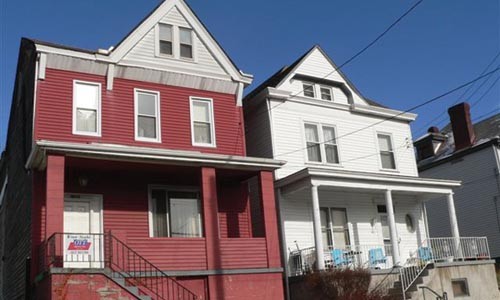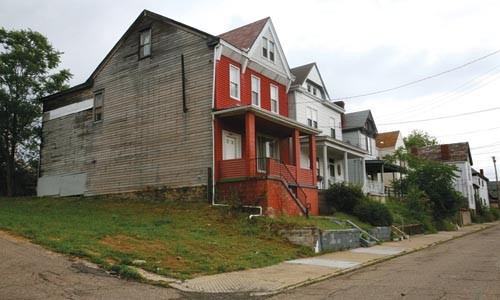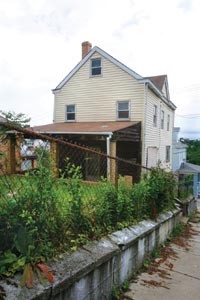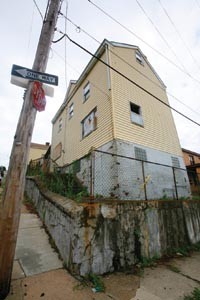The deal looked good to Tami Twidwell. She would buy five properties in Western Pennsylvania on the cheap, turn them into rental units and make back her investment.
"We wanted some rental properties and we were told that ... there's always a shortage of good rental housing, good landlords in Pittsburgh," she says.
And she couldn't believe the prices.
"We'd never heard of houses for $15[,000] and $20[,000] and $25,000 -- other than Detroit, which everyone knows about."
Eventually, Twidwell purchased five properties in the area, for prices ranging between $15,000 and $17,850. Three were located in McKeesport, one in Mount Oliver and one in the Allentown neighborhood of Pittsburgh.
But Twidwell, who lives in Oregon, knew little about Pittsburgh. She'd never been to the city, and never inspected the properties before buying them. The transaction was carried out mostly online, and the people who sold her the homes claim they probably never saw the properties either.
It wasn't until after she purchased them that Twidwell saw the houses for herself.
"We went out there at Thanksgiving [2006] and I just cried because they were just all wrecks," she says. "Until we came out, we didn't realize what we had."
What Twidwell had, she says, were derelict properties in struggling neighborhoods, a couple of which she saw no hope for renovating.
The Allentown and Mount Oliver homes are empty and boarded up. After making improvements, Twidwell says, one of her McKeesport homes is rented, and another is half-occupied. The third, though, has been "gutted" and is "worthless," she says.
This isn't Twidwell's first foray into real estate. She owns property in Washington state and Oregon. In one deal, she says, "We got the houses probably at half price." But this time, she says, she didn't get what she expected.
In Pennsylvania, Twidwell has sued Penny Foreclosures, the company that sold her the land, claiming it "intentionally concealed material defects" with the homes. She doubts the suit will ever recoup the cost of legal fees and the money she's already spent trying to improve the houses. But, she says, "Somebody has to say, 'Stop. You can't do this.'"
In the meantime, though, three of Twidwell's properties remain vacant. Their neighborhoods are now saddled with the empty byproducts of a deal gone sour ... a symbol for what can happen when a local real-estate market is no longer local.
Based in Murrysville and owned by the husband-and-wife team of Carlos and Wendy De Oliveira, Penny Foreclosures bills itself online as "a large wholesaler dealer of foreclosed homes in the Midwest."
The company's Web site opens with a splash page: Quotes from Donald Trump ("Investors are like visionaries ... they look beyond the present") and Mark Twain ("Catch the trade winds in your sails") slide over photos of sunsets, sailboats and waterfalls.
Twidwell says she first heard about the company from a business associate in her main job, as the chief salesperson for a company that provides fire and security systems.
"He said he'd bought a couple houses [through Penny Foreclosures] and he was getting payments and they were doing great," she says.
The associate passed along Twidwell's name, and she received a call from a man named Duane J. Thielen. Thielen began e-mailing her about properties for sale.
"THIS IS A GREAT PROPERTY," reads one e-mail that is part of a court filing and describes the Twidwell home in Mount Oliver. "IT'S AN ALL WHITE NEIGHBORHOOD AND GREAT PLACE FOR RENTALS OR OWNER FINANCED HOMES. THE HOME DOWN THE STREET IS SELLING FOR $68,000."
But as most Pittsburghers know, the communities that Twidwell invested in suffer from various challenges. Almost a third of McKeesport's residents live below the federal poverty line, as do nearly one-fifth of Mount Oliver's residents. And in Allentown, more than one home out of every eight was vacant at the time of the 2000 U.S. Census.
"Those were the neighborhoods that were chosen for us to be great rental neighborhoods, to be great investments," Twidwell says.
Twidwell says she did call "a couple other Realtors" to see what they thought of the area. "They said McKeesport is a little rough, but [as a rental area,] it's not bad."
Mostly though, Twidwell alleges in her complaint, she "relied upon representations made by the De Oliveiras" and others -- like Thielen, who Twidwell's lawsuit contends was "one of the sales agents for Penny Foreclosures."
"I know this all sounds ridiculous and I sound like the stupidest person in the world," she admits. But, "I just never dreamed that in the United States of America ... people could just lie about what things are."
This isn't the first time the De Oliveiras, who declined to comment for this story, have been in court. They are defendants in a March 2008 suit that makes allegations similar to Twidwell's. And they are the plaintiffs in a defamation suit filed that April. The De Oliveiras are suing nine business and individuals for allegedly "circulating information ... that was inaccurate, untrue, false, deceptive, defamatory, derogatory and disparaging."
In their complaint, the De Oliveiras attached a mass e-mail in which one of the defendants allegedly complained of being "not informed of the true condition and value of the houses I bought" from Penny Foreclosures and others.
However, the De Oliveira's attorney, George Farneth, says that Penny Foreclosures doesn't just operate legally: It performs a public service. Wholesalers like Penny, he says, pick up foreclosed properties and sell them to investors -- who in turn can provide housing to "people who are at the lower end of the income scale," a market that "traditional real-estate agents shy away from."
The De Oliveiras sell properties in "as-is condition," he adds, and they make no promises about their condition. Penny Foreclosures can own "hundreds to potentially thousands of properties at any time," he says. "Typically, my clients [don't] really see these properties before they were purchased," Farneth says. As for Twidwell's land, "I do not believe my clients inspected any of those properties beforehand."
Thus, he says, Penny had "no real opportunity to learn the condition of the properties." Penny Foreclosures purchased the five homes it re-sold to Twidwell in early 2006, for between $5,100 and $9,100.
"Someone like Ms. Twidwell bears an awful lot of risk, and bears an awful lot of responsibility to do due diligence and know exactly what kind of a property she's purchasing," Farneth says.
Under Pennsylvania law, "If the seller is aware of some hidden defect in the property, they have an obligation to disclose it," says Arnie Horovitz, a local attorney who has closed a handful of transactions involving out-of-state parties. But if a seller has never seen the property, Horovitz asks, "How do you show that the seller was aware that water was seeping in?"
And in this case, Farneth denies that his clients ever dealt directly with Twidwell. Instead, Penny Foreclosures uses contractors to find potential investors, and to scout potential properties -- what their court response calls "bird dogs."
In their legal filings, the De Oliveiras claim that beginning in 2005, they had an oral agreement with two bird dogs -- Jonathan Wakefield and Rebecca Reichenbach -- to find properties that "required a minimal amount of maintenance, repairs and/or renovations."
The De Oliveiras don't concede that Twidwell's properties require more than that ... but if they do, their legal filings contend, it would be Wakefield and Reichenbach's fault. They would have been "breach[ing] the terms of the oral contract" to find properties that needed only minimal repair.
On the other end of the deal, the De Oliveiras say that Thielen, of Washington state, claimed to be "working with numerous real-estate investors who were looking to purchase real estate in the Western Pennsylvania area."
Thielen was "an independent contractor ... a go-between, if you will," Farneth says.
So if Twidwell had a false impression of the property she was getting, that wouldn't be Penny's fault either: If Thielen made claims about the properties "that were not completely true ... he did so on his own volition," the De Oliveiras legal filings argue.
Thielen declined to comment for this story, but in a court filing, he claims the "oral agreement [between him and the De Oliveiras] was never entered into a written contract," and thus cannot be enforced. His response did not address the e-mails sent to Twidwell.
Wakefield and Reichenbach, meanwhile, have accused the De Oliverias of including them as defendants to intimidate them. In an interview, Wakefield says, "The type of properties [the De Oliveiras] were looking for changed all the time," and their guidelines weren't in writing.
Wakefield says he doesn't understand why Penny Foreclosures wouldn't check out the properties themselves.
The De Oliveiras "had no knowledge of the property, no knowledge of the neighborhood," he says, even though "they were, in some cases, 20 minutes to an hour from the property."
Similarly, Wakefield says that while he likes Twidwell, "Why in the world -- she bought five houses. Come down and look at them."
It's hard to know how many homes are bought by people who've never seen them.
For most home purchasers, "Buying a home online sight unseen is very rare," says Stephanie Singer, a spokesperson for the National Association of Realtors. In a nationwide survey from July 2007 to June 2008, the association found that fewer than 1 percent of home buyers did so through the Internet without at least sending someone to check out the property.
Still, dozens of Pittsburgh-area properties are advertised on Craigslist every day. And data from RealSTATs, which tracks local property sales, suggests that out-of-state purchases like Twidwell's are on the rise.
Non-Pennsylvanian buyers accounted for 3.2 percent of open-market residential sales in Allegheny County in 2008 -- up from 1.1 percent in 2000.
The trend has been more pronounced in the city: Through May of this year, out-of-state buyers made up 7.3 percent of residential purchases in Pittsburgh (excluding inter-family sales and sales under duress, such as foreclosure) -- up from just 1.5 percent in 2000.
On paper, the prices seem almost irresistible.
While this article was being written, for example, a Crawford-Roberts home was opening up for bid on eBay at $8,000. A home in McKeesport attracted 17 bids -- the highest of which was only $4,560.
And those are just the retail sales. Firms like Penny Foreclosures specialize in wholesaling real estate -- buying and selling homes in large numbers.
The homes can change hands quickly. For example, a home in Larimer sold for $1,250 on Bid4Assets.com on May 29 -- even though the seller disclosed that the property had been condemned and had back taxes. (The sale's auction page provided a photo, but warned, "The picture provided is believed to be of the property, but this has not been confirmed in person.")
The winning bidder, "Billsfan4Life," could not be reached for comment. But county property records show that the single-family dwelling was sold three times in less than three years.
In the summer of 2007, a Texas company called Homesales Inc. purchased the property in a sheriff's sale for less than $2,000. By the end of the year, the property had been resold to Bryce Peters Financial Corporation, for just $250. The following April, Bryce Peters sold it to Illinois-based Crusade Properties LLC for $3,000, county records show.
Today, the home's front door is boarded up and the bushes surrounding it are overgrown. You can only guess what the home's recent owners saw in it.
City Paper could not locate a phone number for Homesales Inc. A call to Bryce Peters was not returned, though the company's Web site explains that it helps "many of the countries [sic] largest institutions" unload properties that are "unsellable."
Illinois state records list a Donna Sveinsson, of Lakemoor, Ill., as an agent of Crusade Properties. But when CP attempted to call Sveinsson, the woman who answered the phone refused to identify herself or answer questions.
Often, Horovitz says, buyers purchase properties on the cheap because they "feel they're getting a low enough price [and] can take the risk." When investors buy and sell in volume, after all, a loss on a single property isn't going to hurt them too badly.
Rick Sikora, a Mount Oliver real-estate agent, says, "There are probably 1,000 wholesalers out there [in this area]" -- each with their own motivations.
"Some of them buy up 30, 40 properties at a time and sell them off to investment groups," Sikora says. "Some of them buy them up at five or 10 at a time and sell them to other wholesalers.
"And some of them just buy them and hold them, hoping that the value will go up in five or 10 years."
It doesn't always work out that well -- for the property's buyer or the people next door.
"Just drive by" the house in Allentown, Twidwell urges. "Go to the neighborhood. See if that's a house that you would want to own."
The Allentown house, at 615 Industry St., is condemned. The city issued the notice on March 11, because the building's "foundation has deteriorating mortar and holes." The condemnation notice also cites rotted wood and missing sections, among other problems with the structure: loose bricks in the chimney, broken windows and missing downspout sections.
Twidwell says she's "fighting the condemnation right now." And "we've probably dumped $10,000" into stabilizing the structure.
"Boarding it up, sealing it, having pest control come -- all these different things to preserve it as much as possible while we wait through this lawsuit."
In the meantime, Twidwell's Allentown neighbors are saddled with a vacant property. Buildings like that can attract vandals, pests and squatters.
For such reasons, Mayor Luke Ravenstahl made demolition a large part of his revitalization platform -- doubling the budget for knocking down empty houses in 2008, and increasing it by another quarter in 2009. Last year the city razed 502 vacant structures.
"I'd like them all torn down," says Linda Baldauf, who's lived down the street from 615 Industry for 40 years.
When asked how many vacant properties are in her neighborhood, Baldauf laughs. "You got a while?" she asks.
The house across the street from her is for sale. A few doors down, at the corner of Millbridge and Industry streets, a large white house has been tagged with graffiti and boarded up. On the next block there's a patch of matted straw -- the site of a duplex that burned down, Baldauf says.
"I'm afraid somebody's going to set [the corner house] on fire," she says.
Vacant houses can harm a neighborhood even when they don't burn down.
Judy Hackel, the president of the Allentown Community Development Corporation, says that "vacant properties are scary to me because they just become more rentals" -- and renters are less likely to upkeep their houses than occupant-owners.
"The problem here is, the homeowners have decided this neighborhood isn't worth anything," adds Hackel, who also lives on Industry. And one of her biggest obstacles in getting Allentown back on track is the perception "that it's not safe." Vacant homes don't help, she says.
For her part, Twidwell says that she wanted to improve the neighborhood. "I think a lot of people went into these things for flips," she says. "That wasn't us."
If anything, she says, public officials are looking to cash in on her.
Regarding her house in Mount Oliver, she says, "We can cut the grass, and a week later get a notice for grass-cutting because they look for out-of-state people to bother. It's free money, right?"
Tom Plietz, Mount Oliver's code-enforcement officer, calls Twidwell's 141 Freemont house "one of my steady customers" because "nothing is transpiring with the property." But he says he'd rather see owners "invest in the property than invest in the fines."
Plietz estimates that between 10 and 15 percent of properties in the borough have been abandoned. Mount Oliver Mayor Jeff Repasky says officials are trying to break a vicious cycle, in which vacant and deteriorating properties depress the value of homes nearby.
"It's aggravating," he says. In a borough like Mount Oliver, when the older generation dies off, kids inherit the property, but not necessarily a desire to take care of it. "Maybe [they] sell it for less than value to an investor. And here we go," Repasky says.
The borough's demolition budget can't keep up, and Repasky says there's no "return for code enforcement. ... The time and effort we put in, they get a slap on the wrist."
And that's when the owner's wrist is close enough to slap.
Repasky says he'd like to see more "code enforcement with some teeth in it. If you cite somebody, I don't care if it's a bank in Chicago."
But when it is in Chicago -- or anywhere else outside the borough -- things get harder for local officials. Plietz says he's had out-of-town investors who've "been cited, [and] never appeared in court. ... They're not going to be extradited."
Attorney Arnie Horovitz says that tracking down the seller in an online real-estate transaction presents special difficulties. "[Sellers] may move around," he says, or the "[t]elephone number's no good."
Investors may also create multiple corporate identities, making it difficult to track down who actually owns the property.
"There are corporations out there," Plietz says, "I don't know if they were fictitious or they went belly up."
Once, Plietz drove to Homestead to deliver a citation to an owner supposedly based there. But when he arrived at the address, he says, "There wasn't even a building."
Sikora, the Mount Oliver agent, has advice for anyone who wants to get into real-estate investing: "Make sure you're dealing with a reputable Realtor." (You can search for Realtors online at www.realtor.org, and check a licensed agent's disciplinary history at www.licensepa.state.pa.us.) Licensed salespeople are regulated by the State Real Estate Commission, which handles complaints from customers. The commission can cite agents, or strip them of their licenses.
Otherwise, though, you can't count much on law enforcement.
"It's 'buyer beware,'" Sikora says. "A lot of people think it's quick and easy. [But investors] have to understand that things could go awry at any time." And if one private party sells a bad piece of real estate to another, "it's not really covered by anything," Sikora says.
The state attorney general can go after companies that are taking advantage of customers -- but won't prosecute for a business dispute.
"It has to be part of a pattern of deceptive business ... a threat to all of the consumers in Pennsylvania," says Nils Hagen-Frederiksen, a spokesman for state Attorney General Tom Corbett. Otherwise, he says, a customer's only recourse is often to file a civil suit.
Before buying real estate, "It's worth your while to sit down with professionals," he says. "And review the property. ... A few photos [don't] replace looking in person."
"I don't think photographs give you a real good picture of what you're buying," agrees Horovitz.
"My sense is, [most sellers] aren't out to defraud somebody," Horovitz says. Even so, "they're dealing with junk property." And often with these properties, "Everybody's flipping them until somebody's stuck with it."
"You can shop for a lot of things over the Internet," adds Hagen-Frederiksen. "But there's a big difference between buying an album on iTunes and buying a house."























